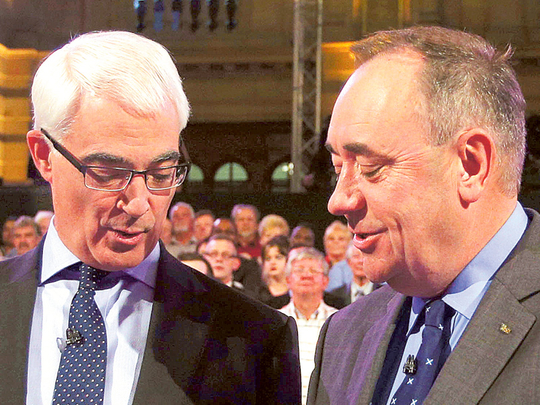
LONDON: Campaign leaders clashed over Scotland’s future in a fiery final TV showdown, with the pro-independence side hoping a strong showing will give them momentum as postal voting begins on Tuesday.
Pro-independence Scottish First Minister Alex Salmond emerged the clear winner in a snap Guardian/ICM poll in which 71 per cent said the Scottish first minister had bested his opponent, “No” campaign leader Alistair Darling, excluding “undecideds”.
But experts questioned whether the victory would be enough to bridge a stubborn gap in polls, in which the Yes Scotland campaign has long lagged behind the anti-independence Better Together.
The debate was heated, with the two rivals interrupting, challenging and talking over each other on topics that ranged from what currency an independent Scotland would use, oil reserves, defence, to the fate of the National Health Service (NHS).
In his opening statement, Salmond underlined the historic nature of the decision, saying that independence would free Scotland from austerity policies and military spending.
“Absolutely no one will run the affairs of this country better than the people who live and work in Scotland ... We are a rich nation and a resourceful people. We can create a rich nation and a more fair society”, Salmond said.
In return, Darling sought to sow doubt in Salmond’s vision, saying the details were not clear enough and emphasising uncertainty over what currency an independent Scotland would use.
Salmond is “asking us to take his word for it on everything. No plan B for anything. Trust what he says? Sorry, I can’t,” Darling rebutted.
The pro-independence camp was 14 points behind in the latest YouGov poll for The Times last week, which said 43 per cent of respondents would vote “Yes” to the split compared to 57 per cent who would vote “No”.
However, the gap between the two camps appears to have narrowed slightly in recent weeks.
“Certainly most commentators will reckon that probably Mr Salmond was the winner tonight, but whether he has done enough to move the numbers I think may be another question,” politics and polling expert John Curtice of Scotland’s University of Strathclyde told BBC News.
Almost a fifth of voters are expected to begin receiving their ballots by post on Tuesday ahead of referendum day on September 18.
Darling was quick to bring the debate to the question of what currency an independent Scotland would use — perceived as a weak point for the Yes Scotland campaign in the past.
But this time Salmond seemed on stronger footing as he insisted that a vote for independence would give him a mandate to demand a currency union with the rest of the United Kingdom, an idea that the three main parties in Westminster have rejected.
Darling accused Salmond of talking “nonsense” over estimates of revenues from North Sea oil, which would be an independent Scotland’s economic lifeblood.
Salmond in turn accused Darling, a former Chancellor of the Exchequer in a Labour government, of being “in bed with the Tories”.
In a heated section of the event in which the two took turns cross-examining each other, Darling snapped “you don’t have to lecture me”, while Salmond said irritably “you don’t have to point Alistair”.
Both were challenged by members of a lively audience of 200.
Darling argued that staying in the United Kingdom would guarantee jobs, but appeared to falter as Salmond doggedly questioned him on what powers Scotland would be granted to create jobs in the future.
The 90-minute debate was split into four parts, with sections dedicated to the economy, domestic policy, Scotland’s international place, and “what happens after the vote”.
The debate touched on the fate of the British nuclear programme Trident, under which missiles are stored in a Scottish naval base.
Salmond said an independent Scotland would reject nuclear weapons, which he called a “waste of money as well as being morally wrong” — but was criticised by an audience member concerned about the risk to jobs.
The debate turned to discussion of the NHS after an audience member inquired what the impact of independence would be on the health service and those with long-term illnesses.
Salmond argued that a split with the rest of the United Kingdom would protect Scotland from cuts to health spending, while Darling insisted that funds for the NHS were due to rise.
In his closing remarks, Darling opted to underline the uncertainty over the currency and end on a note of caution.
“Of course we could go it alone, but I don’t believe that Scotland will be as successful as we will be as part of the United Kingdom,” Darling said.
“I know there are some who are thinking about giving independence a chance, but when we can’t be told about currency, I don’t think that can be trusted.”
Summing up the case for independence, Salmond said there was only one thing that independence could really guarantee, that “at each and every election in an independent Scotland we will get the government that we vote for”.
“The decision we make in three weeks’ time will define us,” Salmond said. “It’s an opportunity which may not come our way again.”












